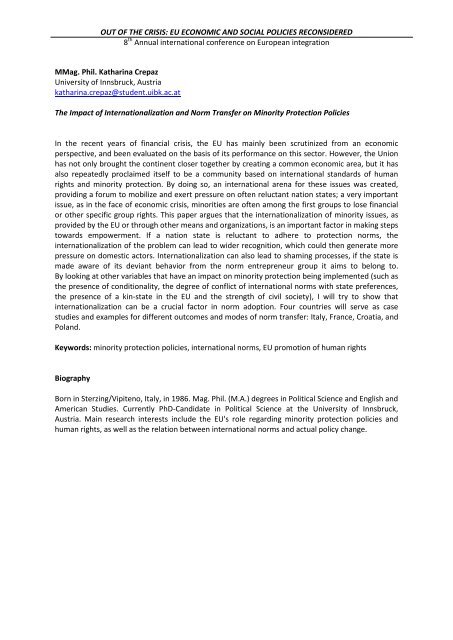BOOK OF ABSTRACTS - University American College Skopje
BOOK OF ABSTRACTS - University American College Skopje
BOOK OF ABSTRACTS - University American College Skopje
You also want an ePaper? Increase the reach of your titles
YUMPU automatically turns print PDFs into web optimized ePapers that Google loves.
OUT <strong>OF</strong> THE CRISIS: EU ECONOMIC AND SOCIAL POLICIES RECONSIDERED8 th Annual international conference on European integrationMMag. Phil. Katharina Crepaz<strong>University</strong> of Innsbruck, Austriakatharina.crepaz@student.uibk.ac.atThe Impact of Internationalization and Norm Transfer on Minority Protection PoliciesIn the recent years of financial crisis, the EU has mainly been scrutinized from an economicperspective, and been evaluated on the basis of its performance on this sector. However, the Unionhas not only brought the continent closer together by creating a common economic area, but it hasalso repeatedly proclaimed itself to be a community based on international standards of humanrights and minority protection. By doing so, an international arena for these issues was created,providing a forum to mobilize and exert pressure on often reluctant nation states; a very importantissue, as in the face of economic crisis, minorities are often among the first groups to lose financialor other specific group rights. This paper argues that the internationalization of minority issues, asprovided by the EU or through other means and organizations, is an important factor in making stepstowards empowerment. If a nation state is reluctant to adhere to protection norms, theinternationalization of the problem can lead to wider recognition, which could then generate morepressure on domestic actors. Internationalization can also lead to shaming processes, if the state ismade aware of its deviant behavior from the norm entrepreneur group it aims to belong to.By looking at other variables that have an impact on minority protection being implemented (such asthe presence of conditionality, the degree of conflict of international norms with state preferences,the presence of a kin-state in the EU and the strength of civil society), I will try to show thatinternationalization can be a crucial factor in norm adoption. Four countries will serve as casestudies and examples for different outcomes and modes of norm transfer: Italy, France, Croatia, andPoland.Keywords: minority protection policies, international norms, EU promotion of human rightsBiographyBorn in Sterzing/Vipiteno, Italy, in 1986. Mag. Phil. (M.A.) degrees in Political Science and English and<strong>American</strong> Studies. Currently PhD-Candidate in Political Science at the <strong>University</strong> of Innsbruck,Austria. Main research interests include the EU's role regarding minority protection policies andhuman rights, as well as the relation between international norms and actual policy change.







![amerikan kolex ]e bide prv univerzitet od treta generacija vo ...](https://img.yumpu.com/47278343/1/190x252/amerikan-kolex-e-bide-prv-univerzitet-od-treta-generacija-vo-.jpg?quality=85)








